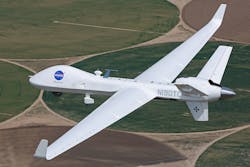GA-ASI flies SkyGuardian as part of NASA Demonstration
SAN DIEGO – On April 3rd, General Atomics Aeronautical Systems, Inc. (GA‑ASI) flew its SkyGuardian Remotely Piloted Aircraft (RPA) in the skies above Southern California as part of a joint flight demonstration with NASA. GA-ASI was selected to participate in NASA’s Systems Integration and Operationalization (SIO) activity, which includes multiple flight demonstrations focusing on different types of Unmanned Aircraft Systems (UAS) and their respective flight environments. GA-ASI and NASA have worked collaboratively since 2014 to prove the safety of flying large UAS in the National Airspace System (NAS).
GA-ASI demonstrated ways in which SkyGuardian can be used for a variety of commercial and public services applications, using its onboard sensors. Services featured in the demo included inspections of hundreds of miles of rail, power line, communication and canal infrastructure, agriculture monitoring and topological surveys, as well as wildfire and flood monitoring.
“Our work with NASA is opening the eyes of regulators to the safety and utility of unmanned aircraft systems in the performance of certain tasks for public and commercial good,” said Linden Blue, CEO, GA-ASI. “Our aircraft have already played important roles during crisis management events such as wildfire containment. Our airborne sensors can see through thick smoke, enabling us to inform ground personnel about the locations of fire lines so they can deploy resources efficiently. The SIO demonstration highlighted how the aircraft can be used for many other civilian and commercial missions.”
After taking off from GA-ASI’s Gray Butte Flight Operations Facility near Palmdale, Calif., SkyGuardian flew through the NAS in Southern California towards Yuma, Ariz. while being operated by a remote pilot based at Gray Butte. The pilot used the GA-ASI-developed Detect and Avoid System (DAAS) to provide situational awareness of air traffic near the UAS. The DAAS includes a Traffic Alert and Collision Avoidance System (TCAS II) used in manned aircraft that fly in civil airspace. It also has an air-to-air, “Due Regard” Radar to provide detection and tracking capability of any nearby aircraft which may not have active transponders. Using the DAAS, the remote pilot was able to “see” and navigate around airborne traffic just like an airborne pilot.
“NASA’s goal to help accelerate routine UAS operations into the national airspace has moved one step closer with this successful flight demo,” said Mauricio Rivas, UAS integration in the NAS project manager at NASA’s Armstrong Flight Research Center. “Our efforts with General Atomics and our other SIO industry partners will help commercial UAS move closer towards certification.”
GA-ASI’s technology partners for the demonstration include Honeywell (supplied the TCAS II for the DAAS), and Collins Aerospace for the Command and Non-Payload Communications (CNPC) datalink radios, which is part of the Command and Control datalinks system.
